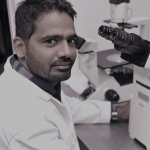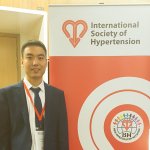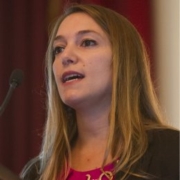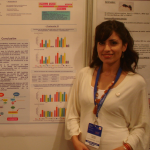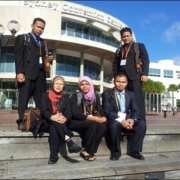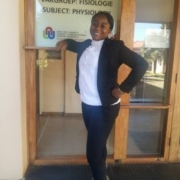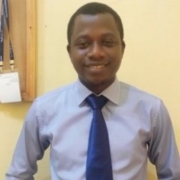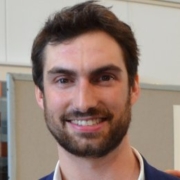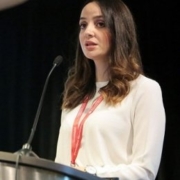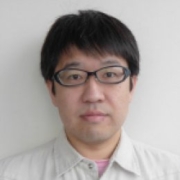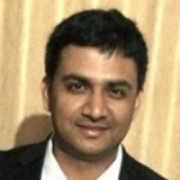How did you become interested in research relating to Hypertension?
I joined my first lab in my sophomore year of college. I learned that the most popular area in academia and industry is cancer/tumor study for its high mortality and morbidity rates. The core cause is fear. But fewer people fear cardiovascular disease (CVD). Maybe it’s too common. People already get used to it. However, they don’t know the CVD is an assassin. Over 17.9 million people die each year from CVD. They don’t realize that CVD is the lead killer in all diseases. To me, studying on cardiovascular disease is much important than the others. Before I made the decision of selecting the Ph.D. program, I joined the institution of hypertension and nephrology at Sun Yat-Sen University in China as a research intern. In there, I learned that hypertension is the most important modifiable risk factor for cardiovascular morbidity and mortality.
Describe your research & the program/lab (info of your supervisor) that you are in?
My research focuses on understanding the renal functions in cardiovascular disease. Particularly the role of (pro)renin receptor (PRR) in regulating water and sodium balance. These studies have resulted in eight peer-reviewed first-author or co-first-author publications in prestigious journals including JASN, PNAS, JCI Insight (accept), Hypertension, BMC Medicine, AJP-Renal, etc. These series of studies have uncovered the novel roles of PRR in renal control of fluid homeostasis and blood pressure. I joined Dr.Tianxin Yang’s lab at the University of Utah in 2013. My supervisor, Dr.Yang, is an outstanding and well-funded expert in the area of renal physiology. His long-term interests are renal hormonal control of fluid metabolism and blood pressure with an emphasis on prostaglandins, nuclear receptors, and (pro)renin receptor. He is a successful supervisor with a demonstrated record of research and training.
What do you consider to be your substantial scientific contribution so far (provide PubMed PMID if possible)?
The most important contribution is identifying the physiological role of collecting duct PRR and its soluble form, sPRR, in regulating water and sodium balance (PMID: 27000064; 26984496). These findings have contributed to our fundamental knowledge of how (pro)renin/(pro) renin receptor regulate sodium-water balance and local renal RAS, thus blood pressure.
What is your favourite manuscript from a lab other than your own (provide PubMed PMID if possible)?
My favourite manuscript is “Collecting duct-specific deletion of peroxisome proliferator-activated receptor gamma blocks thiazolidinedione-induced fluid retention. (PMID: 15956187) ” This paper uncovers the fundamental mechanism of rosiglitazone-induced edema. Rosiglitazone, the insulin sensitizer, is a powerful medication for diabetes with a severe side effect of plasma volume expansion. This cause the limitage usage of this class of drug. The manuscript published in PNAS directly benefit clinical practice.
What facilities are essential for your research?
Guangzhou Medical University, China; Sun Yat-Sen University, China; and University of Utah Health, U.S.A.
Where do your research strengths lie? Why? What are your research weaknesses? How will you improve?
I enjoy reading stories, analyzing data, and dig the connection between the data and the truth. I love to share the ideas with my colleagues and receive different kinds of feedback. Also, I have golden hands to perform the experiments great and in time.
My weakness is over-interpretation of the data and overly optimistic. The technical weakness is writing in English. The rigorous postdoctoral training will help me deal with these issues.
Describe your unforgettable (proudest) moment in science, and the most challenging situation that you have had to overcome (lessons learnt) so far?
My proudest moment to date was Dr. Boye L. Jensen wrote editorials to introduce my work published in JASN which uncover the role of the prorenin receptor in regulating water balance.
The most challenging situation I have had to overcome is our scientific opinion conflict with the experts in the field. It takes my colleagues and I a lot of time to convince others via publishing papers in journals and presented in conferences.
At which conference did you first present? How was your experience?
My first oral presentation was at the 2014 AHA Hypertension Scientific Session. My overall experience has been amazing. I think I did really well that time with no nervous. Presentation in hundreds of people is a great experience.
What upcoming conferences will you be attending, and what is the furthest distance that you have traveled for a conference?
The upcoming conferences are 2019 EB meeting and 2019 Hypertension Scientific Sessions.
The furthest distance I have traveled is 2018 ISH conference.
How did you learn about ISH/NIN and its activities?
I learned about the ISH from my supervisor, Dr.Tianxin Yang. He is an active member in ISH.
How did you become interested in research relating to Hypertension?
As a cardiologist I have always been interested in cardiovascular primary prevention programs, with a special focus on arterial hypertension. When I finished my fellowship in cardiology I had the opportunity to join the Austral University Hospital’s Arterial Hypertension department.
Describe your research & the program/lab (info of your supervisor) that you are in?
Currently my research focuses on autonomic dysfunction and its relationship with target organ damage. We evaluate subjects in primary prevention who attend the Cardio-metabolic Unit, in the department of cardiology of Austral University Hospital. Blood pressure and heart rate are recorded through home BP monitoring/ 7 consecutive days.
We defined an index of autonomic dysfunction (standard deviation of systolic BP/standard deviation of HR) and found a relationship with arterial stiffness and left ventricular mass index, with a trend toward with carotid plaques.
What do you consider to be your substantial scientific contribution so far (provide PubMed PMID if possible)?
Unfortunately I have not published a manuscript as a first author yet, but I am working on it!
- Lack of RAAS inhibition by high-salt intake is associated with arterial stiffness in hypertensive patients.
Kotliar C, Kempny P, Gonzalez S, Castellaro C, Forcada P, Obregon S, Cavanagh E, Chiabaut Svane J, Casarini MJ, Rojas M, Inserra F.
PMID: 24833624
What is your favourite manuscript from a lab other than your own (provide PubMed PMID if possible)?
There are many manuscripts focused on blood pressure variability but my favorite is the study by Rothwell PM, et al: Prognostic significance of visit-to-visit variability, maximum systolic blood pressure, and episodic hypertension. Lancet. 2010 Mar 13;375(9718):895-905.
PMID: 20226988
What facilities are essential for your research?
We routinely use devices for the non-invasive measurement of arterial stiffness and central blood pressure (Mobil-O-graph), carotid intima-media thickness and endothelial function (ultrasonography), home blood pressure monitoring (MicroLife).
Where do your research strengths lie? Why? What are your research weaknesses? How will you improve?
My research strength lies in my background as a clinical cardiologist and the amount of patients that we received in the cardio-metabolic unit.
My major weakness is in the area of biostatistics.
Describe your unforgettable (proudest) moment in science, and the most challenging situation that you have had to overcome (lessons learnt) so far?
My proudest moment was the defense of my Master Degree in Vascular Mechanics and Hypertension a few days after the birth of my son.
The most challenging situation was during my first presentation in English in the ESH/ISH congress 2014 in Athens. Luckily I received a lot of positive feedback.
At which conference did you first present? How was your experience?
My first presentation was at the European Society of Hypertension/International Society of Hypertension congress 2014 in Athens, Greece. I was very nervous because, as I mentioned above, it was my first presentation in English.
What upcoming conferences will you be attending, and what is the furthest distance that you have traveled for a conference?
I am going to participate in the next 26th Argentine Congress of Hypertension. April 2019. Mar del Plata (Argentina)
The furthest distance that I have traveled for a conference was from Buenos Aires (Argentina) to Seoul (South Korea) in 2016 to the ISH conference.
How did you learn about ISH/NIN and its activities?
I was invited to participate in the ISH New Investigator Committee Networking and Mentorship Event, Athens, June 2014.
What area(s) do you wish to specialize in the future?
I would like to continue my training as a researcher in hypertension. As a clinical cardiologist I am interested in clinical and translational research and I am seeking to have a training experience overseas, to bring new ideas and back to Argentina.
Who is your role model in Science? Why?
My role model is Dr. Sergio Gonzalez, one of my mentors. He is a great cardiologist and he was the first to introduce me in hypertension.
What are your scientific goals? Advise for talented emerging scientists?
As I mention above, I am preparing my first manuscript publication that is my short term goal. My long term goal is to start a PhD program and have an international experience in research to increase my record of publications.
My advice for emerging scientists is to love what you are working on and never give up!













